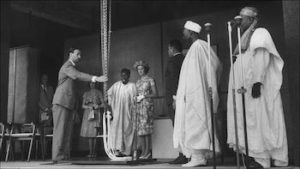
Prime Minister of-Nigeria, Abubakar, Tafawa Balewa 2R Princess Alexandra
*On this date in 1960, The Federation of Nigeria gained independence from the United Kingdom. The UK retained the British monarch, Elizabeth II, as nominal head of state and Queen of Nigeria. This liberation was an effort that began in the aftermath of the Berlin Conference in 1884
Nigeria's government was a coalition of conservative parties: the Nigerian People's Congress (NPC), a party dominated by Northerners and those of the Islamic faith, and the Igbo and Christian-dominated National Council of Nigeria and the Cameroons (NCNC) led by Nnamdi Azikiwe.
Azikiwe replaced the colonial governor-general in November 1960. The opposition comprised the comparatively liberal Action Group (AG), dominated by the Yoruba and led by Obafemi Awolowo. The cultural and political differences between Nigeria's dominant ethnic groups the Hausa and Fulani ('Northerners'), Igbo ('Easterners'), and Yoruba ('Westerners') – were severe. An imbalance was created in the organization as a result of the 1961 plebiscite. Southern Cameroons opted to join the Republic of Cameroon, while Northern Cameroons chose to remain in Nigeria.
The northern part of the country was now far larger than the southern part. 1963, the nation established the Federal Republic, with Azikiwe as its first president. When elections were held in 1965, the Nigerian National Democratic Party came to power in Nigeria's Western Region.